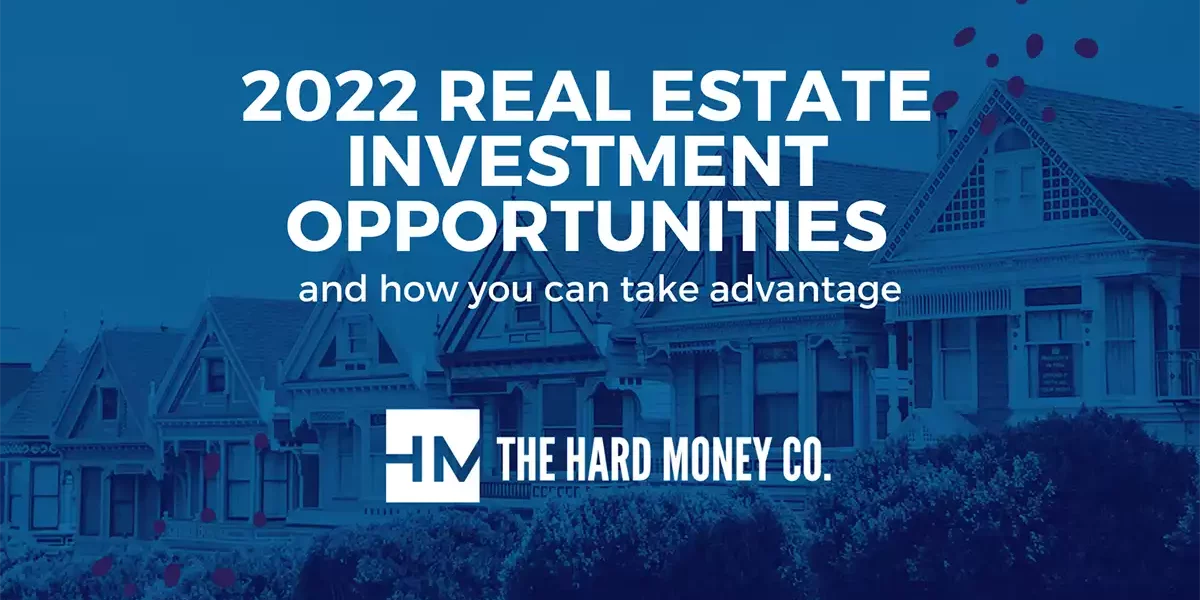There's no such thing as 'adjusting to the new normal', anymore. The world is moving too fast for us to get complacent with the environment around us. Whether it be the pandemic, global political instability, or economic uncertainty, we are faced with more challenges than ever before. But while these may be obstacles to some, they also present investment opportunities for those ready to act.
This is especially true in the real estate market, where recent trends have caused some significant upheaval. We saw the housing market explode and it's only just begun to slow down. We've also seen disruptions in the supply chain that have slowed development and instigated inflation as more and more dollars are pursuing fewer goods. While these things are widely viewed in a negative light, many have exploited these factors for financial gain.
We at The Hard Money Co. have observed some emerging trends for 2022, and have identified opportunities for motivated real estate investors to yield the rewards.
Rising Interest Rates and Inflation
Inflation has been a nationwide news story for the better part of the year. Americans everywhere are feeling the pain of inflation with annualized rates approaching 9%. The reasons for this are complex, but the federal government has a pretty straightforward and simple method for curbing future increases; they're going to raise interest rates. Making money 'more expensive' is a reliable macroeconomic tactic for slowing spending and inflation. They won't make any drastic changes in the short term, because they don't want to hurt strong economic growth, but they will need to signal that we are moving out of a spending free-for-all.
How does this affect real estate investors like yourselves? First and foremost, it will make future loans more expensive. Average 30-year fixed mortgage rates are up 1.5% since the pandemic to 5.1%. At this rate, a $200,000 loan will cost you an additional $63,720 over your lifetime! This number will get increasingly more daunting if rates rise 2-3% on top of that. If you have ambitions to enter the property market or refinance on an existing property, you would benefit significantly by doing that sooner rather than later.
Rising inflation also makes it more difficult to obtain the materials and labor you might need to perform your property renovations. Average prices at your big box hardware stores are up 22% YoY. These increasing costs eat into your budgets and may even require more long-term financing. Using the rationale of rising loan rates, think of what these price increases are if you roll them into your 30-year refinanced mortgage.
Rising Interest Rental Rates
But it isn't all doom and gloom. Rising rates also have a direct effect on the rents you are able to charge your tenants. In most cases, property owners are actually able to keep their rents in line with rising interest costs allowing you to recoup your increased expenses as you pay them. Be sure that you are communicating any changes with your tenant as straightforwardly as possible and ensure that you are following all regulations on the books.
Along with the ability to raise rental prices, your property is also likely to gain significant value. The obvious reason for this is the hot housing market, where first-time homebuyers have signaled that they are willing to pay well over prevailing prices to become property owners. This demand may slow in the coming years, but the supply side of the equation has also experienced a shock. Increasing construction costs have reduced the number of new properties that have been built since 2020. This constrained supply will likely be reflected in the housing market for years to come and may buoy the value of your property.
Family Rentals are in Demand
We mentioned that increased rental rates will make it easier to maintain rising interest expenses, but there are other reasons to believe that rentals will remain strong. With home prices up almost 20%, many young families that might've sought to buy their own properties are now stuck in the rental market. This means that your single- and multi-family rentals will be in high demand for some time to come. The vacancy rate is observed to be as low as 4.8% in some markets meaning that you should have little difficulty renting out your units at prevailing rates.
Remote Work Opportunities
The advent of remote work over the last two years has also given young professionals and families the ability to relocate from urban centers. This means that your rental units outside of the country's biggest cities are increasingly in demand. Millennials, who now are the biggest generational cohort in the labor market, have expressed a clear interest in using their newfound freedom to relocate to cheaper markets that still offer the amenities and culture of New York, Chicago, or San Francisco. According to national trends, the most popular places to live in 2022 are increasingly in these smaller markets. Cities like Minneapolis, Kansas City, and Denver (and their suburbs) have all seen upticks in relocations. This means that the rental markets in those places will continue to be in demand.
-
-
- Raleigh, NC
- Charleston, SC
- Austin, TX
- Oklahoma City, OK
- Tampa, FL
- Boise, ID
- Providence, RI
- Minneapolis, MN
- Cincinnati, OH
- Jacksonville, FL
-
These cities aren't small towns by any means, but they do offer a significant amount of value as employees are empowered to work from anywhere.
Conclusion
The uncertainty in the economy may be daunting, but there are also opportunities for investors who do the legwork. Use your position to your advantage to explore how these changing factors may benefit your unique situation. If you have questions, The Hard Money Co. is here to help.


